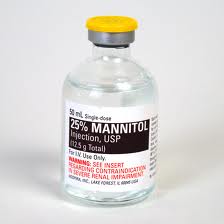 Mannitol is a natural substance that causes osmosis and diuresis, which results in loss of body water. Mannitol acts on the kidneys by causing an increase in filtration and preventing water reabsorption in the kidney tubules. Mannitol (brand name, Osmitrol) was approved for use by the FDA in 1964 and is currently among the World Health Organization's list of important medications.
Mannitol is a natural substance that causes osmosis and diuresis, which results in loss of body water. Mannitol acts on the kidneys by causing an increase in filtration and preventing water reabsorption in the kidney tubules. Mannitol (brand name, Osmitrol) was approved for use by the FDA in 1964 and is currently among the World Health Organization's list of important medications.
What Is Mannitol Used for?
Mannitol is a diuretic, or a drug that increases your urine output. It is often used to prevent or treat excess water accumulation in the body, which may occur in kidney disease, brain swelling, or increases eye (intraocular) pressure. It increases fluid excretion through the kidneys and helps reduce pressure in your brain or eyes.
Mannitol is available as an intravenous injection, which comes in various concentrations (5%, 10%, 15%, 20% and 25%) and bottle sizes.
How Is It Administered?
Mannitol injections are usually administered in hospitals, doctor's offices, or clinics. Mannitol dosage differs for its various uses and indications:
Mannitol Dosage for Adults and Children
Mannitol dose varies based on the condition being treated.
1. Adult Mannitol Dose
- Cerebral Edema – for reducing intracranial pressure:
1.5 to 2 g/kg body weight, IV infusion over 30 to 60 minutes
- Intraocular Pressure – for reducing pressure inside the eye:
1.5 to 2 g/kg body weight, as 15% to 25% solution, IV infusion over 30 to 60 minutes
- Anuria/Oliguria – to increase urine outputand prevent acute renal failure
Test dose: 200 mg/kg IV infusion, over 3 to 5 minutes
Loading mannitol dose: 500-1000 mg/kg body weight (1 dose)
Maintenance mannitol dose: 250-500 mg/kg body weight, every 4-6 hours
- Adjunct treatment for intoxication: 5% to 25% solution, as long as patient has high urinary output
2. Pediatric Mannitol dosage
- Edema: initial dose of 0.25-1 g/kg body weight; maintenance dose of 0.25-0.5 g/kg every 4-6 hours
- Anuria/Oliguria:Test dose of 0.2 g/kg body weight over 3 to 5 minutes, but not > 12.5 g
Mannitol should be discontinued if there is no urine output within 2 hours.
Note:
- Do not use mannitol if the bottle contains particles, if the contents are discolored, or if the bottle is damaged or cracked
- Keep mannitol out of children’s reach
- Contact your doctor immediately if you miss your usual Mannitol dose
Mannitol Side Effects
Contact your doctor/nurse immediately if any of these side effects occur while using Mannitol:
Common:
- Dizziness
- Increased urination
- Runny nose
- Headache
- Nausea
Less common
- Chest discomfort/tightness
- Difficulty breathing
- Shortness of breath
- Wheezing
- Cough
- Heaving
- Sore throat
- Vomiting
- Fever or chills
- Confusion
- Blurred vision
- Muscle cramps
- Fast or irregular heartbeat
- Extreme thirst
- Headache
- Severe allergic reactions (hives; rash; itching; swelling of the mouth, face, lips, or tongue)
- Report to your doctor any experience of difficulty urinating or extreme dizziness.
Some of these side effects can occur, but may not need treatment. Ask your healthcare provider how to prevent or reduce some side effects. Tell your doctor if they persist or become worse.
Mannitol Safety Information
DON’T use mannitol or tell your doctor if you have any of the above conditions:
- If you are allergic to it
- If you have heart failure
- If you have severe kidney disease, severe pulmonary problems, bleeding in your brain or severe dehydration
Before you use mannitol, tell your doctor if you have these medical conditions, which may interact with the use of mannitol:
- You are pregnant or planning to become pregnant
- You are breast-feeding
- You are taking other medicines, herbal preparations, or dietary supplements
- You have known allergies to certain foods, medicines, or other substances
- You have some swelling, heart problems or kidney problems
Important safety information:
- Some dizziness may occur while using mannitol and this may become worse if you are taking it with certain medicinesoralcohol. Avoid driving or performing other heavy tasks when using mannitol.
- Keep all doctor appointments. Lab tests such as blood counts, blood electrolytes, kidney function tests, lung function tests, and heart function tests may be required to monitor for progress and side effects.
- Use of mannitol in ELDERLY individuals must be done with caution since they may experience more side effects.
- The effectiveness and safety of mannitol in pregnant women, breastfeeding mothers and young children (<12 years old) have not been confirmed. Talk to your healthcare provider about the use of mannitol in these patients.
Proper Storage
Mannitol is stored by health care providers and hospitals. If it is being used at home, store it as directed by your healthcare provider or pharmacist. Always keep it out of children’s reach.
